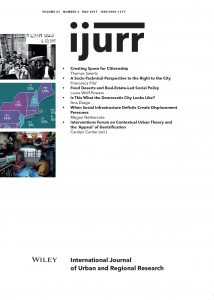The significance of practising theory in context reflects current debates in urban studies as well as the history of poststructural thought whose scholarship, informed by postcolonial critique and understandings of ethics and responsibility in international research collaboration, continues to give evident substance to the nature of epistemological violence. This essay takes up the challenge of contextual theory and empirical research through a critical comparative approach that ultimately finds how the expansive gentrification balloon pops as a consequence of assumptions and misassumptions that leave consequential data hiding in plain sight. The contributions of this essay include treatment of the transposition of ideas as a theoretical, methodological and ethical problem, and an original comparative summary of the frequency of ‘gentrification’ in the news media of ten major cities in addition to the print and online media of Hong Kong. The analysis demonstrates not only how context matters in research design, but also how distinction in the articulation of theoretical argument will be upheld or deflated by knowledge of, and acquired in, context. The essay summarizes the arguments for the larger Interventions forum, and concludes that a critical-theoretical comparative international urban studies generates and builds through refinement of theory in iterative dialogue with historical processes.

